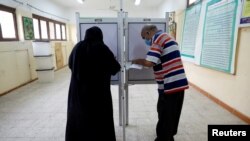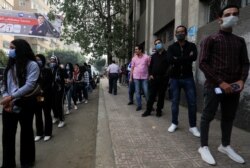Egypt began the second phase of elections for its lower chamber of parliament Saturday in 13 of the country's 27 provinces. A runoff election will be held in several weeks to determine the final winners.
Egyptian media showed voters turning out Saturday morning to cast their ballots at polling stations in half of the country that didn't vote during an earlier round last month. Music blared as poll workers welcomed voters to cast ballots in Ismailiya, amid strict security and COVID-19 health precautions.
Egyptian state TV showed President Abdel Fattah el-Sissi casting his ballot at a polling station in a Cairo suburb not far from the presidential palace. The president urged Egyptians to "perform their civic duty and vote." Egyptian security forces were out in force to make sure voting went smoothly.
Lasheen Ibrahim, head of Egypt's National Electoral Commission, told journalists the judiciary was overseeing voting in the 9,468 polling stations open Saturday during the second phase of parliamentary elections. Polling stations, he added, "are being sterilized to prevent the spread of COVID-19".
He says the electoral commission contracted with outside parties to sterilize polling stations at the outset of voting on both Saturday and Sunday, and at the close of voting, both days.
President Sissi's "Future of the Nation" party put in the strongest showing in the first phase of voting several weeks ago. Egypt's semi-official Ah Ahram newspaper reported that voter turnout was 28.06 percent of nearly 31 million eligible voters in the first round.
Sixty-three million Egyptians are eligible to vote in both rounds of the election, and voters could face a $30 fine if they do not vote. Such fines, however, are rarely imposed.
Said Sadek, who teaches political sociology in Cairo, tells VOA that "no political system can look modern without a parliament ... and that the presence of a parliament is a sign of stability and normalcy in the country."
"The parliament which is now being elected," he notes, "is the second under President Sissi, and it consolidates the regime both domestically and internationally at a time when most of the Middle East is experiencing turbulence."
Four-thousand candidates are running for 50% of the eligible seats in the 568-seat chamber, while slightly more than 1,100 candidates are vying for the other half of the chamber, which is being elected by party list. Sissi also will appoint members to an extra 28 seats.
The Muslim Brotherhood, which was ousted by a popular revolution backed by the military in 2013, was not permitted to run any candidates, and its representatives in Qatar and Turkey, denounced the election.





